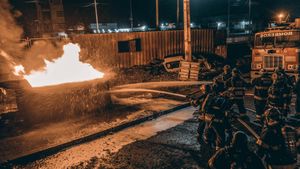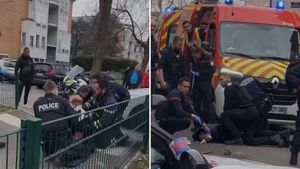The headquarters of the European Union Commission was violently attacked today during demonstrations organized by the far-right party Vazrazhdane, who expressed strong opposition to Bulgaria's adoption of the euro and its entry to the Eurozone scheduled for 2026. The attack occurred amid heated protests, which culminated in vandalism against the commission's building and clashes with security forces.
The demonstrators, several thousands strong, began their protest outside the Central Bank and eventually marched to the EU Commission's headquarters. What started as peaceful expressions against the euro quickly escalated as protesters began throwing eggs, launching balloons filled with red paint, and eventually setting fire to the entrance of the building.
During the melee, at least ten police officers were reported injured as they attempted to restore order, and six individuals were arrested for their role in the chaos. The protesters, chanting slogans like "Resign" and "No to the euro," also burned the EU flag, marking another disturbing chapter of civil unrest related to Bulgaria's impending monetary change.
Ursula von der Leyen, President of the European Commission, condemned the violence from her social media profile, branding the actions as "outrageous." She stated, "We exercise the right to protest peacefully. Violence and vandalism are never the answer," emphasizing the importance of lawful and peaceful demonstration within European values.
Bulgarian authorities quickly denounced the attack, with an official statement asserting, "The attacks against institutions, both national and European, are unacceptable and contradict the principles of the rule of law." The government stressed its commitment to uphold order and maintain the democratic right to protest without resorting to aggression or vandalism.
This isn’t the first time Vazrazhdane has resorted to extreme measures, as similar incidents of aggression involving red paint and other types of vandalism against national and EU institutions were documented previously, including one notable event in May 2023.
During this latest protest, some participants voiced extreme sentiments, reportedly shouting statements like "The war must start," inciting fears of worsening tensions within Bulgaria's already polarized political climate.
Vazrazhdane party, which holds 35 of the 240 seats in the Bulgarian Parliament, seeks to block Bulgaria’s transition to the euro by organizing public pressure through protests, including the recent collection of over 600,000 signatures for a referendum on retaining the national currency, the lev. Despite considerable public support reflected through these signatures, the Bulgarian Parliament resisted their call for this referendum, leaving supporters frustrated and increasingly aggressive.
Across the political spectrum, reactions have varied. Roberta Metsola, President of the European Parliament, labeled the events as "shameful and unacceptable," urging for immediate accountability for those involved. The division between pro-European advocates and anti-euro factions is becoming more pronounced, challenging Bulgaria’s stability as it navigates its path within the European community.
While the demonstration focused on the issue of currency, it also underlined the broader anxiety many feel about national sovereignty and EU interference, as evidenced by the extreme measures employed by the demonstrators to voice their dissent.
Looking forward, the Bulgarian government faces the challenge of reconciling societal divides over the euro and ensuring public order. Experts warn of potential escalations if the dialogue between the government and the opposition does not address the underlying tensions and the citizens’ grievances.
The events of today serve as a stark reminder of the fine line between peaceful protest and chaotic unrest, bringing to light the pressing issues Bulgaria must confront on its path toward EU integration. The nation's future will depend on balancing such fervent expressions of dissent with the need for security and public order.



